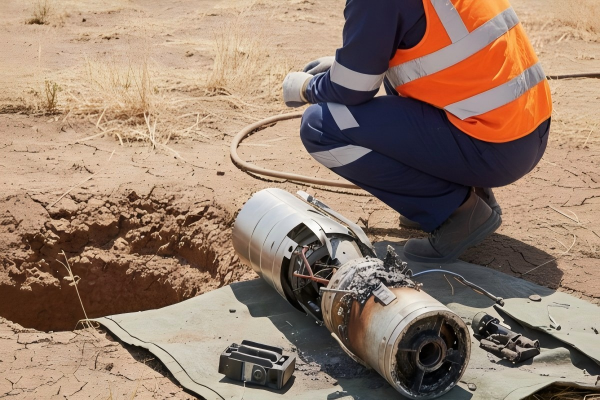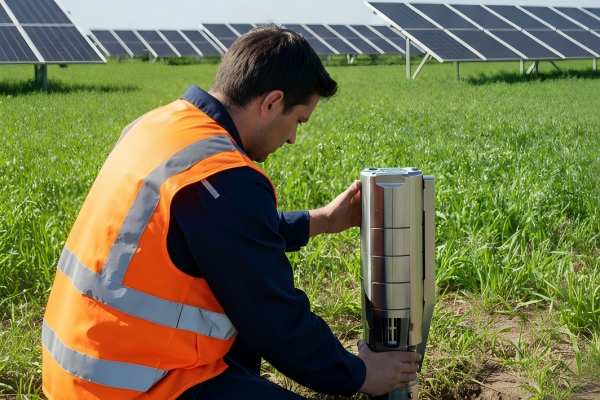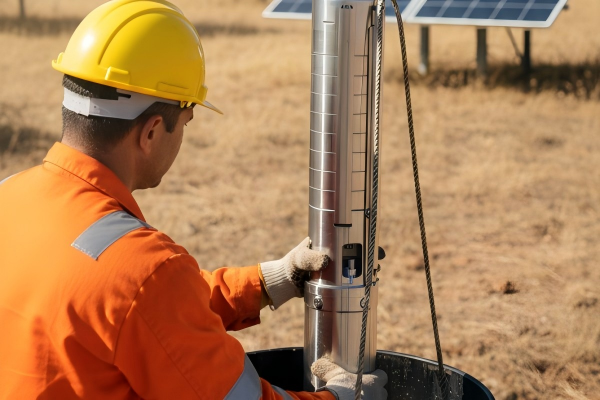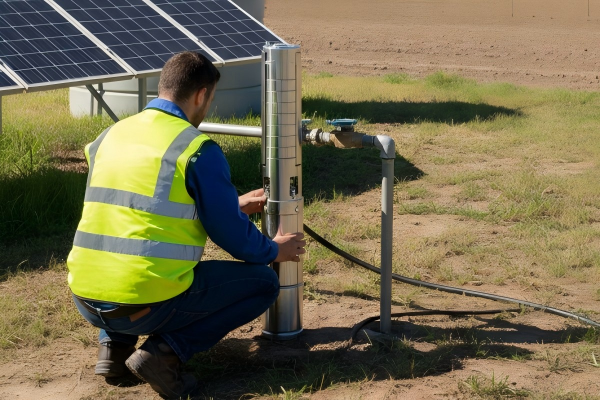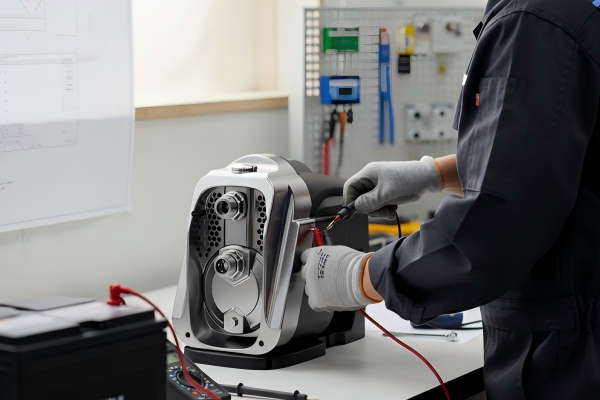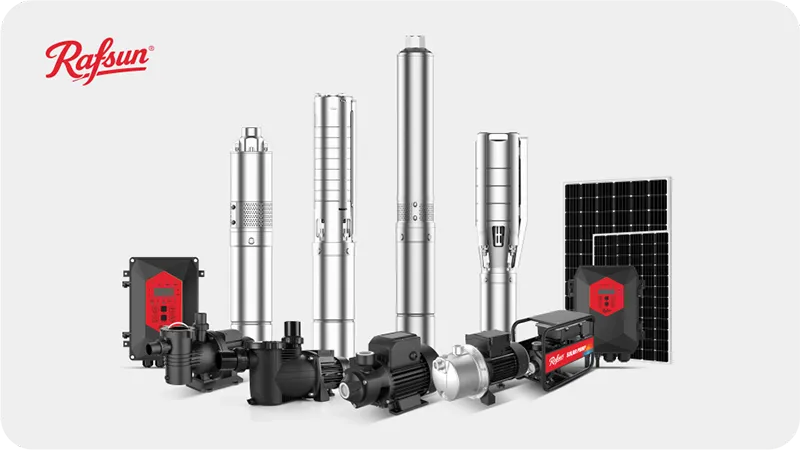Worried about your water pump running all night?
This can cause leaks or drain your battery, leaving you stranded and with costly repairs.
Generally, it's not recommended to leave a standard RV water pump on overnight unattended due to risks like leaks, battery drain, and pump wear.
For solar pumps, nighttime operation is possible but requires a battery storage or hybrid system.
Monitoring the system or using alternatives is the safest approach.
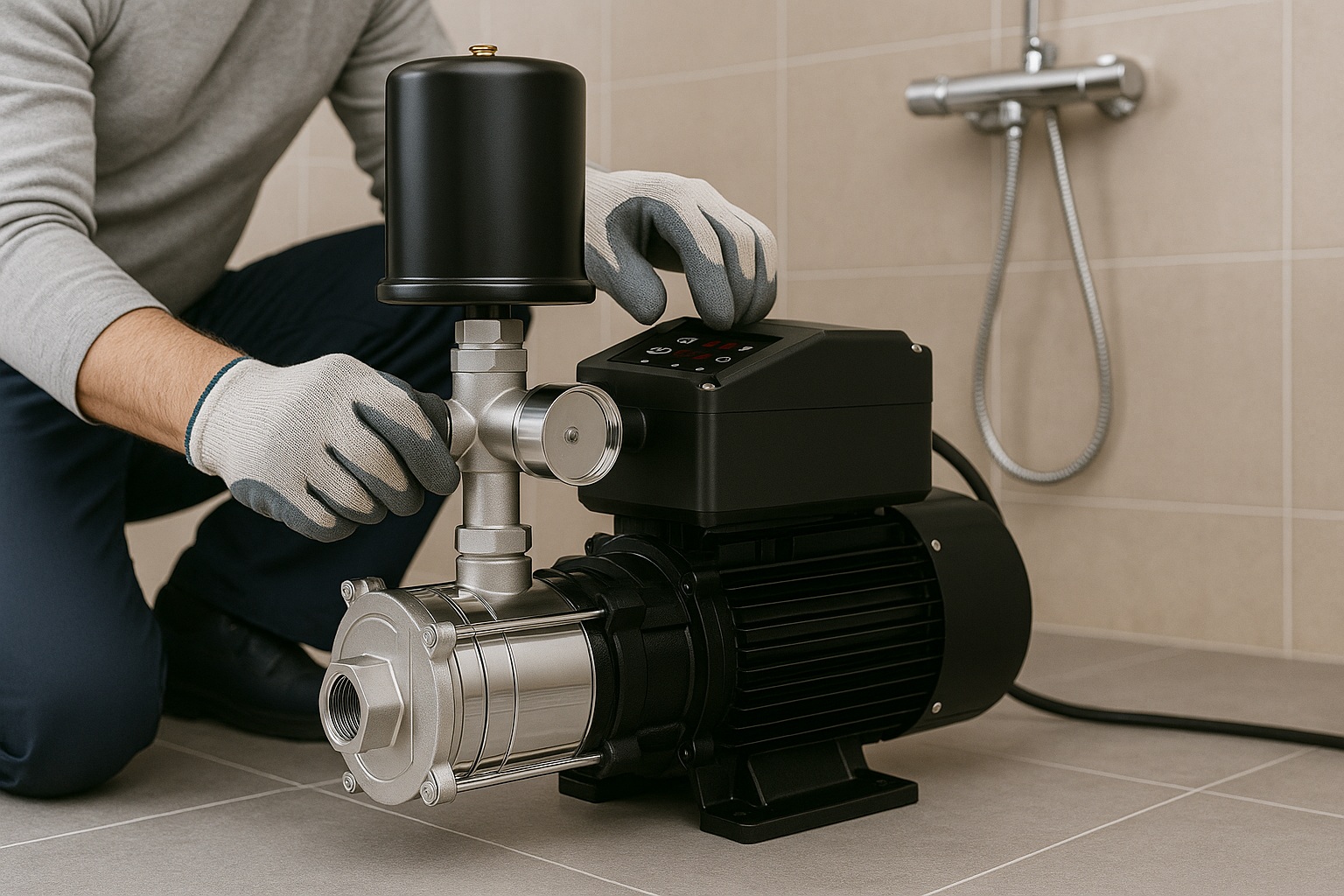
Whether you're in an RV or relying on a solar-powered system, managing your water pump is a critical concern.
It's not just about convenience; it’s about protecting your investment, conserving resources, and ensuring safety.
This guide explores everything you need to know about water pump usage.
We will cover the risks, the safe practices, and the smart alternatives to ensure you have water when you need it, without the worry.
Let's dive into the details to keep your water flowing safely and efficiently, day or night.
Risks of Leaving the RV Water Pump On Overnight
Leaving your pump on seems convenient, but a hidden leak could cause catastrophic damage.
Don't let a simple oversight ruin your trip or your vehicle's interior.
Yes, leaving an RV water pump on can cause significant problems.
The biggest risks include unnoticed water leaks leading to severe water damage, complete battery drainage that leaves you without power, and the pump overheating or suffering excessive wear, which drastically shortens its lifespan.
The decision to leave a water pump on overnight is a balance between convenience and risk.
While modern pumps have some built-in safety features, they cannot prevent all potential issues.
Understanding these risks in detail is the first step toward making an informed decision and protecting your equipment.
Constant pressure on an aging plumbing system can expose its weakest points, and a pump cycling unnecessarily is a drain on your precious power resources.
Let's break down the primary dangers one by one.
Unpacking the Danger of Water Leaks
A continuously pressurized water system is always looking for a way to escape.
A loose fitting, a cracked hose, or a faulty faucet that might only drip occasionally can become a steady stream under constant pressure.
This is especially true in an RV, where vibrations from travel can loosen connections over time.
According to the National Fire Protection Association (NFPA), plumbing issues are a notable cause of RV incidents.
An unattended leak overnight can saturate flooring, warp cabinetry, and destroy sensitive electronics.
The damage can be silent and extensive, often discovered only when it's too late.
| Risk Factor | Potential Outcome | Prevention Tip |
|---|---|---|
| Loose Fittings | Slow drip turns into a steady leak. | Regularly inspect all connections. |
| Old Hoses | Hoses can crack and burst under pressure. | Replace brittle or aging hoses. |
| Faulty Faucets | Internal seals fail, causing leaks. | Check faucets for drips before leaving the pump on. |
The Silent Drain on Your Battery
Most RV water pumps run on your 12V DC house battery system.
Even if the pump is not actively pumping water, it draws a small amount of power to remain on standby, ready to respond to a pressure drop.
If a small leak causes the pump to cycle on and off all night, the power drain becomes significant.
For those who are boondocking or camping off-grid, battery power is a lifeline.
Waking up to a dead battery means no lights, no furnace fan, and possibly no way to start your generator or retract your slides.
It effectively strands you.
Proper battery management is key, and minimizing unnecessary power draws, like a constantly armed water pump, is a fundamental part of that.
Overheating and Mechanical Wear
Water pumps are designed for intermittent use, not continuous operation.
They use the water they are pumping as a coolant.
If your freshwater tank runs dry while the pump is still on, the pump will run continuously without any water.
This "running dry" scenario causes the motor to overheat rapidly.
Overheating can damage the pump's internal components, such as the diaphragm and motor windings, leading to premature failure.
Even without running dry, every time the pump cycles on, it contributes to the wear and tear on its mechanical parts.
Leaving it on overnight, where it might cycle frequently due to tiny pressure drops, accelerates this aging process and reduces the pump's overall lifespan and efficiency.
When It’s Safe to Leave the Water Pump On
You need water on demand while dry camping, but you're worried about the risks.
How can you get the convenience you need without compromising safety?
It can be safe to leave your RV water pump on in specific, monitored situations.
This is common when boondocking, provided you practice water conservation and closely monitor battery levels.
For short overnight stays where you are present, it is generally acceptable, especially if you have safety measures in place.
While the default advice is often "turn it off," there are many scenarios where leaving the pump on is practical and necessary.
The key is not to leave it on blindly but to do so with awareness and preparation.
By understanding your system and implementing a few best practices, you can mitigate the associated risks.
This allows you to enjoy the convenience of running water without the constant worry of potential disasters.
Let's explore the conditions under which leaving the pump on can be considered a safe and calculated choice.
Boondocking and Dry Camping
When you are camping off-grid, you rely entirely on your RV's self-contained systems.
Connecting to a city water hookup isn't an option.
In this case, your onboard water pump is essential for everything from flushing the toilet in the middle of the night to getting a glass of water.
Turning the pump switch on and off every time you need water is highly impractical.
Therefore, most boondockers leave their pump on.
The safety here comes from active monitoring.
You are inside the RV, so you are more likely to hear a pump running continuously, which would signal a leak.
You are also actively managing your resources, including your fresh water supply and battery levels.
Best Practices for Safe Operation
If you choose to leave the pump on, certain measures can drastically reduce the risks.
These practices turn a potential gamble into a manageable and safe routine.
- Use a Pressure Regulator: Even though you are using the onboard tank, an accumulator tank works alongside your pump to smooth out water flow and reduce pump cycling. It maintains pressure in the lines, so the pump doesn't have to kick on for every minor use, reducing wear and noise.
- Practice Water Conservation: The less water you use, the less the pump runs.
This naturally saves battery life and extends the time between filling your fresh water tank.
Low-flow fixtures and mindful habits are crucial. - Regular System Checks: Before settling in for the night, do a quick visual inspection.
Look under sinks and around the toilet for any signs of moisture.
Listen for the pump cycling when all faucets are closed.
This simple check can catch a problem before it escalates.
Know Your System's Condition
The age and condition of your RV's plumbing are critical factors.
A brand-new RV with modern PEX tubing and secure fittings is far less likely to spring a leak than a vintage model with older, more brittle plumbing.
If you know your system is well-maintained and you regularly inspect it, you can have greater confidence in leaving the pump on.
Conversely, if you've had issues with leaks in the past or suspect your plumbing is in poor condition, it's wiser to err on the side of caution and turn the pump off when unattended.
Do Solar Water Pumps Work at Night?
Solar power is fantastic during the day, but your water needs don't stop when the sun goes down.
This leaves you wondering if you'll have water at night.
A standard solar water pump does not work at night because it relies directly on sunlight for power.
However, you can achieve nighttime operation by integrating a battery storage system to store excess energy generated during the day or by using a hybrid system that switches to an alternate power source.
The term "solar pump" can be misleading, as it implies the sun must be shining for it to work.
While this is true for the most basic systems, modern solar solutions are far more versatile.
The goal is to create a reliable, 24/7 water supply using the sun as the primary energy source.
Achieving this requires looking beyond the pump and panels and thinking about the entire system, particularly how energy is stored or supplemented when sunlight is unavailable.
Let's explore the effective methods to ensure your water continues to flow long after sunset.
Battery Storage Solutions
This is the most direct way to power a solar pump at night.
During peak sunlight hours, your solar panels generate more electricity than the pump needs to operate.
This excess power is used to charge a bank of deep-cycle batteries.
When the sun sets, the system automatically begins drawing power from the batteries to run the pump as needed.
- System Sizing is Key: The effectiveness of this solution depends on properly sizing the components.
You need a solar array large enough to run the pump and fully charge the batteries on a typical sunny day.
The battery bank must have enough capacity to power the pump through the night and potentially through a few cloudy days. - Cost vs.
Benefit: Adding batteries and a more sophisticated charge controller increases the initial system cost significantly.
However, it provides true energy independence and a reliable off-grid water supply.
Hybrid Power Systems
A hybrid system offers the best of both worlds: the clean, free energy of solar and the reliability of a conventional power source.
This setup combines solar power with a connection to the electrical grid or a backup generator.
The system is designed to prioritize solar power.
During the day, the pump runs on solar.
If the solar output drops due to clouds or at nighttime, the system automatically switches over to the backup power source.
This guarantees uninterrupted water access, making it an excellent choice for critical applications where a water shortage is not an option.
The Power of Water Storage
Perhaps the simplest and most cost-effective solution is to use solar energy to solve a future problem.
Instead of storing energy in batteries, you store water in a tank.
During the day, the solar pump runs at full capacity, filling a large storage tank, often placed at a higher elevation.
At night, you can draw water from this tank using gravity, without needing the pump at all.
| Method | Pros | Cons | Best For |
|---|---|---|---|
| Battery Storage | True 24/7 on-demand pumping. | High initial cost, battery maintenance. | Off-grid homes needing consistent pressure. |
| Hybrid System | Uninterrupted reliability. | Requires access to grid/generator. | Critical applications, grid-tied homes. |
| Water Storage | Low cost, simple, no batteries. | Requires space for a large tank. | Agriculture, livestock, simple off-grid setups. |
Best Practices for RV Water Pump Usage
You know the risks, but you still need to use your pump.
What are the simple, effective habits that can prevent disaster and keep your system running smoothly?
The safest practice is to turn your water pump off when you are away from the RV or sleeping.
For active use, perform regular inspections of hoses and fittings for leaks, maintain adequate water levels to prevent the pump from running dry, and consider installing an accumulator tank.
Adopting a few key habits can dramatically increase the safety, efficiency, and lifespan of your RV's water system.
It's not about being paranoid; it's about being proactive.
Proper management transforms your water pump from a potential liability into a reliable component of your RV.
These best practices are simple to implement and require minimal effort, yet they provide maximum protection against the common pitfalls of water pump operation.
Think of it as routine maintenance for one of your RV's most essential systems.
The Golden Rule: Turn It Off
The simplest and most foolproof way to prevent overnight leaks or battery drain is to turn the pump off.
Make it a part of your routine before you go to bed or leave the campsite.
Flip the switch off.
This single action eliminates the risk of a leak happening while you're asleep or away and unable to respond.
It also guarantees the pump won't cycle unnecessarily and drain your battery.
For nighttime bathroom trips, you can either flip it on and off as needed or place a jug of water in the bathroom for flushing.
It's a small inconvenience that provides complete peace of mind.
Regular Inspections are Non-Negotiable
Before each trip and periodically during your stay, take a few minutes to inspect your water system.
- Visual Check: Open the cabinets under your kitchen and bathroom sinks.
Look around the base of the toilet and in the bay where the pump is located.
Search for any signs of moisture, drips, or discoloration that might indicate a slow leak. - Listen Closely: When you first turn the pump on, it should run to pressurize the system and then shut off.
If you hear the pump "burping" or cycling on for a second every few minutes when no water is being used, you have a pressure leak somewhere in your system.
This is your audible clue to find and fix the leak before it gets worse.
Maintain Your Water Levels and System Health
A pump's worst enemy is running dry.
Always be aware of the water level in your fresh water tank.
Many RVs have notoriously inaccurate sensor panels, so get into the habit of knowing your usage patterns or visually checking the tank if possible.
An accumulator tank is another highly recommended upgrade.
This small tank holds a bladder of pressurized air and water.
It sits alongside your pump and smooths out the water flow, stopping the rapid, noisy cycling of the pump.
This reduces wear on the pump switch, quiets the system, and provides a more consistent, home-like water pressure.
It's an inexpensive addition that significantly improves performance and longevity.
Conclusion
Leaving your water pump on overnight offers convenience but comes with real risks.
By understanding your system and applying these best practices, you can ensure a safe and reliable water supply on your travels.
Frequently Asked Questions
Can leaving the water pump on cause leaks?
Yes, constant pressure can expose weak points in your plumbing, turning small, unnoticed drips into significant leaks that cause water damage.
Will leaving the pump on drain the RV battery?
Absolutely.
If the pump cycles frequently due to a leak or pressure drop, it can deplete your 12V battery, especially when boondocking.
Can a water pump overheat if left on?
Yes, a pump will overheat if it runs continuously without water, which happens if the fresh water tank runs dry.
This can cause permanent damage.
Why does my RV water pump keep turning on and off?
This is called "cycling," and it means you have a pressure leak somewhere in your system.
It could be a dripping faucet or a loose fitting.
How do I make my RV water pump quieter?
Installing an accumulator tank will reduce pump cycling and noise.
You can also use flexible hoses for connections and mount the pump on a rubber pad.
Is an accumulator tank for an RV water pump worth it?
Yes, an accumulator tank reduces pump wear, saves battery power by minimizing cycling, and provides a smoother, more consistent water flow.
How often should I sanitize my RV water system?
It's recommended to sanitize your fresh water system at least twice a year, or whenever you notice an off-taste or smell in the water.
What is the best way to prevent the water pump from freezing?
If camping in freezing temperatures, ensure your water bay is heated, or winterize your system by draining all lines and adding non-toxic RV antifreeze.


